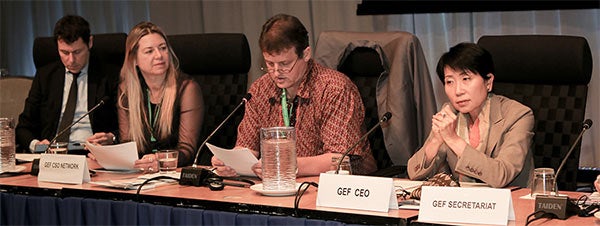
The 49th GEF Council is meeting in Washington, DC to adopt a work program that focuses on climate change, as well as the sustainable management of threatened ecosystems.
Reflecting strong country demand in advance of next month's widely anticipated climate talks in Paris, COP21, the work program has an emphasis on climate mitigation. It also contains an integrated, multi-country program for the Amazon.
As part of the replenishment funding for GEF 6 of $4.43 billion that started in July 2014, the work program requests a total $233.67 million of GEF trust fund resources for 17 projects It addresses unsustainable land management and agriculture in the Amazon, building resilient landscapes in Bhutan, energy efficiency investments in a variety of sectors, and greenhouse gas emissions reductions through land management, technology transfer, and the promotion of renewable energy.
According to the work program paper, with this drivers-based approach, the proposed projects and programs will more directly engage key actors and stakeholders to deliver solutions that are practical, effective, and long-term.
With potential emission reductions estimated at 498 million tCO2e and up to 73.45 million hectares of landscapes and seascapes under biodiversity conservation, the proposed projects and programs would have significant global environment benefits.
"To achieve greater impact at scale, we need to address the underlying drivers of environmental degradation by delivering integrated, holistic solutions," said Naoko Ishii, GEF CEO and Chairperson.

Meeting with civil society organizations (CSOs) today, Ishii emphasized the critical role that CSOs and citizens must play in tackling global environmental challenges. She underscored how the recently adopted Sustainable Development Goals clearly recognize that the health of the environment is the foundation for future development, and that a multi-stakeholder approach is required to achieve transformational change."After New York, global environmental sustainability is at center stage. Integration and synergy is the way to go," said Ishii.
In line with the SDGs, the GEF recognizes the importance of tackling complex, interdependent issues in an integrated manner. To address the SDGs with available GEF programming, the Council will look into adopting ways to work closely with countries to explore synergy opportunities.
Other issues on the Council agenda this week include the GEF's relations with the multi-lateral environmental conventions, future direction on accreditation, the report of the Scientific and Technical Advisory Panel, the Annual Monitoring Review, an update on the preparation of the integrated approach pilots, and knowledge management.